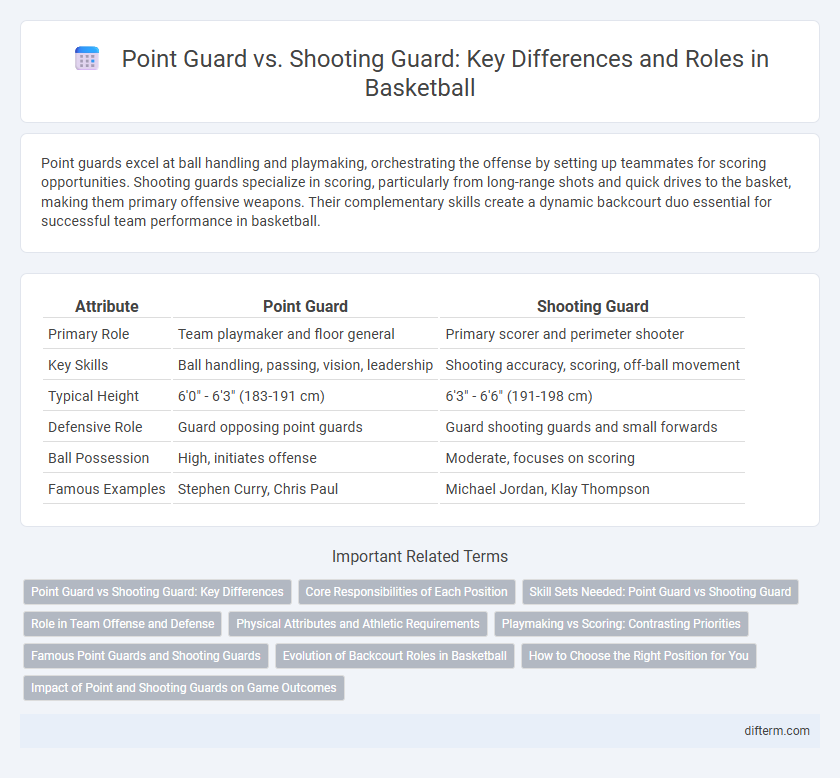Point guards excel at ball handling and playmaking, orchestrating the offense by setting up teammates for scoring opportunities. Shooting guards specialize in scoring, particularly from long-range shots and quick drives to the basket, making them primary offensive weapons. Their complementary skills create a dynamic backcourt duo essential for successful team performance in basketball.
Table of Comparison
| Attribute | Point Guard | Shooting Guard |
|---|---|---|
| Primary Role | Team playmaker and floor general | Primary scorer and perimeter shooter |
| Key Skills | Ball handling, passing, vision, leadership | Shooting accuracy, scoring, off-ball movement |
| Typical Height | 6'0" - 6'3" (183-191 cm) | 6'3" - 6'6" (191-198 cm) |
| Defensive Role | Guard opposing point guards | Guard shooting guards and small forwards |
| Ball Possession | High, initiates offense | Moderate, focuses on scoring |
| Famous Examples | Stephen Curry, Chris Paul | Michael Jordan, Klay Thompson |
Point Guard vs Shooting Guard: Key Differences
Point guards primarily orchestrate the offense, focusing on ball handling, playmaking, and setting up teammates, while shooting guards emphasize scoring through perimeter shooting and driving to the basket. Point guards typically have superior court vision and passing skills, aiding in controlling the game's tempo, whereas shooting guards excel in shooting accuracy and off-ball movement. Defensive responsibilities also differ, with point guards often guarding opposing ball handlers and shooting guards tasked with contesting shooters and defending wings.
Core Responsibilities of Each Position
Point guards primarily manage ball distribution, orchestrate the offense, and facilitate scoring opportunities through precise passing and court vision. Shooting guards focus on scoring by utilizing strong shooting ability, often excelling in mid-range and three-point shots, while also providing perimeter defense. Both positions require agility and decision-making but differ in emphasis: playmaking for point guards and scoring for shooting guards.
Skill Sets Needed: Point Guard vs Shooting Guard
Point guards require exceptional ball-handling skills, court vision, and playmaking abilities to effectively orchestrate the offense and distribute the ball. Shooting guards excel in shooting accuracy, off-ball movement, and scoring versatility, often serving as primary perimeter threats. Both positions demand strong defensive capabilities, but point guards prioritize quick decision-making while shooting guards rely on creating scoring opportunities.
Role in Team Offense and Defense
The point guard typically orchestrates the team offense by facilitating ball distribution and setting up plays, while the shooting guard primarily focuses on scoring through perimeter shooting and driving to the basket. Defensively, the point guard often guards the opposing team's primary ball handler, emphasizing quickness and anticipation, whereas the shooting guard defends against off-ball threats and perimeter shooters, requiring strong lateral movement and contesting skills. Both roles demand high basketball IQ and versatility to adapt to fast-paced offensive and defensive transitions.
Physical Attributes and Athletic Requirements
Point guards typically exhibit superior agility, speed, and court vision, requiring rapid decision-making and precise ball handling to orchestrate plays effectively. Shooting guards demand exceptional height, vertical leap, and shooting accuracy to create scoring opportunities and defend against perimeter threats. Both positions require endurance and quick reflexes, but point guards emphasize agility and coordination, while shooting guards prioritize explosive power and shooting mechanics.
Playmaking vs Scoring: Contrasting Priorities
Point guards prioritize playmaking by orchestrating the offense, distributing the ball, and setting up teammates for scoring opportunities. Shooting guards focus on scoring through perimeter shooting, driving to the basket, and creating their own shots. This distinction shapes their roles, with point guards acting as floor generals and shooting guards serving as primary scoring threats.
Famous Point Guards and Shooting Guards
Famous point guards like Stephen Curry, Chris Paul, and Damian Lillard are renowned for their exceptional ball-handling skills, court vision, and playmaking abilities that drive their teams' offensive strategies. Iconic shooting guards such as Michael Jordan, Kobe Bryant, and James Harden excel in scoring, perimeter shooting, and creating offensive opportunities through their agility and shooting range. The distinct roles highlight point guards' focus on facilitating and orchestrating plays, while shooting guards primarily emphasize scoring and shooting efficiency.
Evolution of Backcourt Roles in Basketball
Point guard and shooting guard roles have evolved significantly, with the former traditionally orchestrating offense and distributing assists while the latter specializes in scoring and perimeter shooting. Modern backcourt players now blend these roles, emphasizing versatility, ball-handling, and switching defensive assignments to exploit mismatches. This evolution reflects shifting NBA strategies favoring positionless basketball and dynamic playmakers capable of scoring, passing, and defending.
How to Choose the Right Position for You
Selecting between point guard and shooting guard depends on your key skills and play style; point guards excel in ball handling, court vision, and directing the offense, while shooting guards prioritize scoring, perimeter shooting, and defensive versatility. Evaluate your strengths in passing, dribbling, and leadership to determine if you are better suited to managing play as a point guard or focusing on scoring as a shooting guard. Consider physical attributes such as agility and shooting accuracy, alongside your ability to read the game, to find the position that maximizes your impact on the basketball court.
Impact of Point and Shooting Guards on Game Outcomes
Point guards often dictate the tempo and involve teammates through precise ball distribution, enhancing overall team efficiency and scoring opportunities. Shooting guards contribute significantly by providing consistent perimeter scoring and defensive pressure, which can shift momentum and counter opposing offenses. Together, their complementary roles influence game outcomes by balancing playmaking and scoring threats.
Point guard vs shooting guard Infographic

 difterm.com
difterm.com